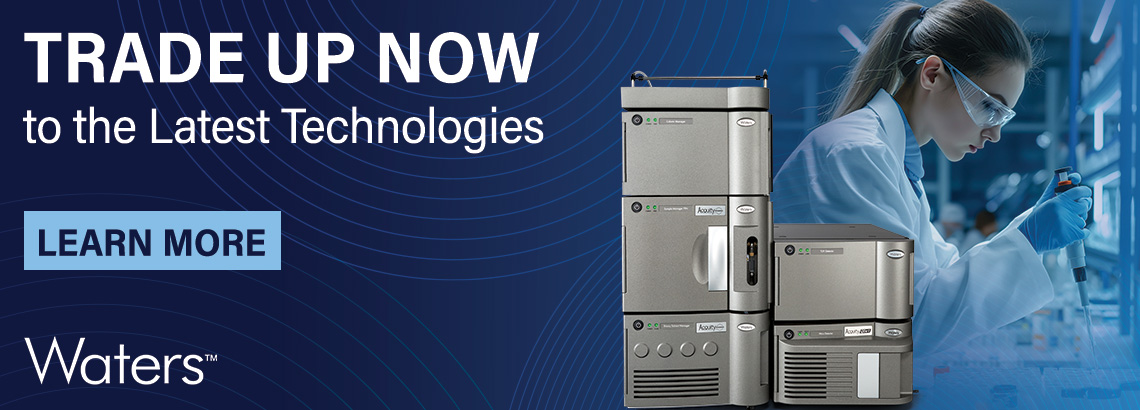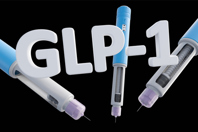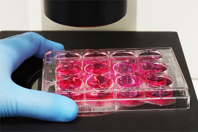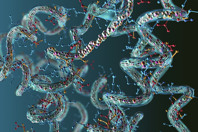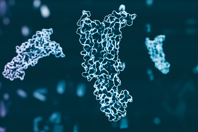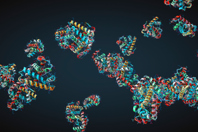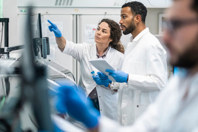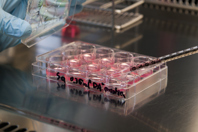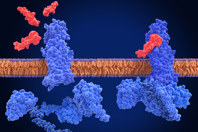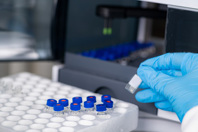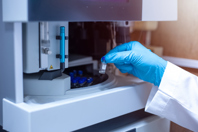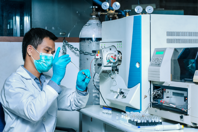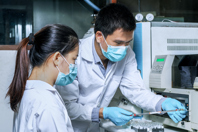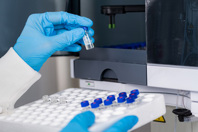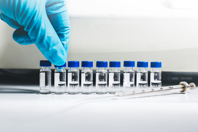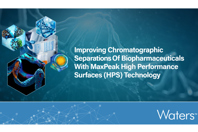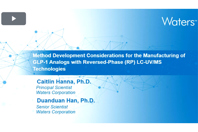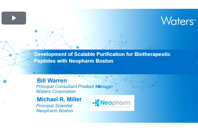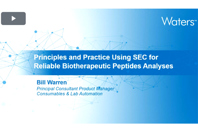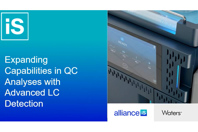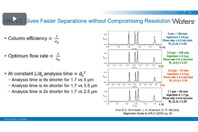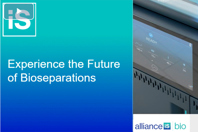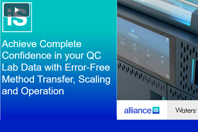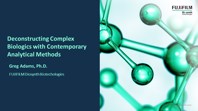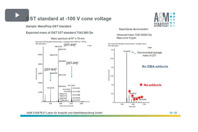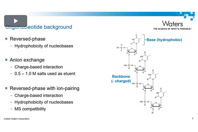
ABOUT WATERS CORPORATION
Waters Corporation, a global leader in analytical instruments, consumables, and software, has pioneered innovations in chromatography, mass spectrometry, and thermal analysis serving the life, materials, and food sciences for more than 60 years. We ensure the efficacy of the medicines we take, the safety of the food we eat and the water we drink, and the quality of the products we use every day. With more than 7,800 employees worldwide, Waters operates in over 35 countries, including 14 manufacturing facilities, and has products available in more than 100 countries. Together with our customers, in labs around the world, we deliver scientific insights to improve human health and well-being, helping to leave the world better than we found it.
ALLIANCE IS HPLC SYSTEM
VIDEOS
-
In this segment from the Pharmaceutical Online Live event, “Balancing GLP-1 Quality With Demand,” our panelists discuss changes to the process and the importance of the change control process to track the results of these changes but also to evaluate the impact of the change. The panelists also jump into batch versus continuous processing and talk about the bottlenecks in scale-up.
-
In this segment from the Pharmaceutical Online Live event, “Balancing GLP-1 Quality With Demand,” our panelists talk about common quality control failures, preventing them with the right analytical methods, and investing enough time and resources in quality control to ensure problems don’t arise.
-
In this segment from the Pharmaceutical Online Live event, “Balancing GLP-1 Quality With Demand,” the panelists discuss how the market has shifted to answer the growing demand for GLP-1 analogs and how innovations in delivery, manufacturing processes and peptide synthesis have helped to aid the demand.
-
In this segment from the Pharmaceutical Online Live event, “Balancing GLP-1 Quality With Demand,” our panelists talk about why differentiating the supply chain is a good idea, anticipating regulatory needs, good communication/documentation, and ensuring a robust tech transfer with contract manufacturing partners.
-
Join us to celebrate 20 years of UPLC innovation. Discover how Waters' groundbreaking technology revolutionized chromatography separations, enhancing speed, sensitivity, and resolution.
FEATURED ARTICLES
-
Discover a detailed guide to characterizing GLP-1 receptor agonists that covers advanced LC-MS and SEC-MALS workflows for impurity profiling, stability testing, and aggregate analysis.
-
GLP-1 receptor agonists are revolutionizing therapeutics beyond diabetes. Explore analytical innovations that ensure safety and efficacy as these peptides expand into multiple treatments.
-
Discover how integration transforms lab workflows to enhance molecular characterization, streamline data management, and ensure compliance for superior data integrity and operational efficiency.
-
Discover how to enhance your peptide analysis by integrating UV and mass spectral data into a single, streamlined workflow to boost data confidence and lab efficiency.
-
Explore a UPLC-UV method using Empower 3 Software to assess synthetic peptide purity. Learn how integrated tools streamline impurity tracking, data reporting, and compliance in peptide analysis workflows.
-
GLP-1 receptor agonists are transforming diabetes and weight loss treatment. Discover how to enable precise impurity analysis and characterization of complex, fatty acid-modified peptide therapeutics.
-
Discover how SEC-MALS enables precise characterization of GLP-1a therapeutics to ensure formulation integrity and enhance safety, efficacy, and regulatory confidence.
-
Achieve ultra-sensitive glucagon quantification with ionKey/MS, μElution SPE, and advanced MS fragmentation to deliver low LOD, reduced sample loss, and enhanced confidence in results.
-
Discover a highly sensitive and reliable LC-MS/MS method for quantifying exenatide in plasma that is powered by advanced sample prep and optimized column chemistries.
-
Discover how LC-UV/MS workflows help overcome analytical challenges in GLP-1 analog development to streamline impurity identification and boost lab efficiency in research.
-
Explore a streamlined LC-UV/MS workflow that empowers labs to meet rising GLP-1 drug demand with faster, more informed decisions that enhance compliance and impurity detection efficiency.
-
Biologics are transforming medicine, with semaglutide leading the way. Discover how an automated LC-MS/MS workflow enables high-sensitivity quantification of peptides in plasma.
-
Column temperature critically affects the reversed-phase separation of fatty acid-modified GLP-1 RAs and impurities. Learn how precise control enhances resolution and reproducibility.
-
Explore the performance of four column chemistries for RPLC-UV impurity analysis of liraglutide and semaglutide, which offers practical guidance for method development in peptide-based therapeutics.
-
Discover a robust, evaporation-free method for analyzing liraglutide in human plasma using LC-MS/MS to ensure high sensitivity, reproducibility, and improved analyte recovery.
-
Explore a validated LC-MS/MS method for precise Semaglutide quantification in plasma, which features enhanced sensitivity, peak definition, and reproducibility using innovative technologies.
-
Discover a streamlined LC-MS/MS workflow for Fc-containing therapeutics like dulaglutide to enable precise quantification with LLOQ as low as 1 ng/mL through automated, efficient assay development.
-
Gain insight into a robust LC-MS/MS method for quantifying therapeutic peptides that supports contamination control and cleaning validation to ensure product safety and integrity.
-
Discover a sensitive, selective, and robust LC-MS method for quantifying semaglutide in plasma with advanced sample preparation and detection technologies for accurate results in bioanalytical research.
-
Discover how an innovative technology enhances LC-MS analysis of GLP-1 receptor agonists by minimizing peptide loss and improving assay sensitivity and consistency.
-
Explore a novel HPLC-UV/MS method for analyzing GLP-1 analogs to address critical challenges in peptide separation, impurity detection, and performance for improved reproducibility.
-
Liquid chromatography revolutionizes science with precision. Discover a technology that leads the charge in enhancing HPLC performance for breakthroughs in health, safety, and environmental research.
-
By embracing data-driven insights, companies can confidently navigate complexities, reduce risks, and deliver trusted products to global markets.
-
Gain expert insights into the driving forces behind change management, the associated obstacles within a QC lab, and best practices for guiding change when implementing new technology or procedures.
-
Here, the USP Tryptophan monograph is evaluated using two HPLC systems. Stability, sensitivity, and performance improvements are assessed with a diffusion-bonded mixer versus standard configurations.
-
Learn about the challenges in HPLC separations of metal-sensitive analytes and how one innovative solution provides improved separations of analytes that adsorb on metal services.
-
Understand the ease and added compliance provided in using embedded software tools in the replication or transfer of an existing method to a new HPLC system.
-
What does two decades of impact look like? Read on to learn about the UPLC system that has redefined industry standards for runtime, resolution, peak shape, and peak capacity.
-
Successful method migration to a new HPLC system can be challenging. The gradient USP method for Quetiapine Fumarate Impurities was analyzed on two legacy HPLC systems and on modern technology.
-
The USP monograph of atorvastatin requires adherence to strict criteria for the assay analysis of atorvastatin. In this study, several strategies were implemented to meet the stipulated USP monograph criteria.
-
The system suitability solution sample from the cetirizine hydrochloride organic impurities USP monograph was used to assess the impact of the needle wash and needle wash design on HILIC separations.
-
The USP monograph for Azithromycin Organic Impurities was chosen as a representative method. Explore the challenges of this method, and compare the results obtained across a number of different HPLC systems.
-
The rising popularity of vitamin supplements necessitates ensuring product content accuracy. In this study, we demonstrate the ability to achieve the same quantitative results on legacy and newer HPLC systems.
-
Soft drinks often contain one or more additives, such as benzoate or sorbate, and/or acesulfame K, saccharin, or aspartame. In this study, a HPLC System was employed for the analysis of these additives.
-
This study demonstrates the successful scaling and migration of a hydrophilic interaction liquid chromatography method for ribavirin analysis from a sub-2 µm column to larger particle sizes on different HPLC systems.
-
The ability to migrate methods across HPLC systems is essential as systems are updated. Review a normal phase method that provides a means for quantification of tocopherols in vitamin supplements.
-
In many regulated labs, there is a need for reliable, robust HPLC systems capable of operating for extended periods of time to accommodate the demand for high instrument utilization and product timelines.
-
This study established a robust HPLC method for analyzing the major active compounds in ashwagandha. Explore the impact of an optimized extraction method using ultrasound and ethanol/methanol/water solvent mixture.
-
In this study, the injection precision of an Alliance iS HPLC System was evaluated using four compendial HPLC methods from the USP with challenging method conditions and strict system suitability criteria.
-
See how you can achieve seamless method transfer from systems equipped with quaternary or binary solvent managers, maintaining separation selectivity without time-consuming method re-optimization.
-
Explore results from a study assessing the ability of a modern HPLC system to support manufacturing labs with the routine downstream analysis of DNA/mRNA therapeutics using SEC.
-
This study assesses a modern HPLC system within a routine QC testing environment focused on peptide-size biopharmaceuticals.
-
Here, a next-generation HPLC system tailored for the robust analysis of biopharmaceutical applications is evaluated for its advantages in size exclusion chromatography (SEC) separations.
-
Gain insight into a global interlaboratory method transfer of a USP organic impurities method that was successfully conducted across eight sites using an advanced HPLC System.
-
Explore a collection of use cases demonstrating the performance of an intuitively simple HPLC system, including common pharmaceutical QC applications, method migration from legacy systems, and more.
-
Explore the advantages of a bio-inert HPLC system through the migration and modernization of a compendial SEC method outlined in the United States Pharmacopeia (USP) General Chapter <129>.
-
Explore findings from a study evaluating the performance of a modern HPLC system in comparison to a legacy system in a routine QC testing environment for biopharmaceuticals.
-
Learn in detail about the impact of change management on the pharmaceutical industry and how it ensures innovations and improvements are managed effectively.
-
We demonstrate how surface chemistry technology enhances the analysis of intact proteins, peptides, nucleotides, glycans, and cell cultures, addressing evolving biopharmaceutical therapeutic needs.
-
Learn about the hardware changes that allow for scaling and modernization of chromatographic methods and how mismatching particle size and liquid chromatographic systems can result in poor performance.
CONTACT INFORMATION
FEATURED SOLUTIONS
BROCHURES AND DATASHEETS
- Increase Speed, Sensitivity, And Resolution With UPLC Column Technology
- The Ultimate Solution For Your Chromatographic Separations
- Intuitively Simple HPLC System For Biopharma
- A HPLC System For An Efficient And Productive QC Lab
- A HPLC System For A New Era Of Intuitive Simplicity
- Arc HPLC
- Mass Detection For Undergraduates
- Control Your Bioprocess Development: Faster Decisions With Quality Data
- Adopting Enabling Informatics Technologies To Drive Digital Transformation And Data Integrity
- Metrology Teams Collaborating With Waters
WEBINARS
-
Explore the expanding role of synthetic peptides in drug development and learn how advanced RP chromatography methods are vital for impurity profiling to ensure safety and efficacy.
-
Discover key strategies for reversed-phase isolation of biotherapeutic peptides, as well as learn about method development, scale-up techniques, and RP/MS analysis to enhance purification workflows.
-
Discover new SEC columns that enable reliable separation of biotherapeutic peptides to enhance CQA measurements for improved safety, efficacy, and quality across LC platforms.
-
Discover how SEC-MALS reveals the aggregation behavior of GLP-1 analogs like semaglutide and liraglutide, which are critical for ensuring the stability, efficacy, and safety of peptide therapeutics.
-
Today's quality control (QC) labs need instruments that can accurately take on a wide range of tasks. Discover a system that allows QC labs to enhance their capabilities and achieve various goals.
-
Discover the fundamentals of UPLC columns and their diverse chemistries. Learn more about versatility in separating small-molecule analytes using reversed-phase and hydrophilic interaction techniques.
-
Hear from an expert panel about recent advancements in HPLC technology, updates to the USP <621> guidelines, the application of AQbD software for method robustness assessment, and more.
-
Watch to hear from a panel of academic and industry thought leaders as they discuss ways to improve LC performance, focusing on biopharmaceuticals such as cell and gene therapy products.
-
Learn about an HPLC System designed to improve outcomes in QC labs with ease of use and simplicity at its core.
-
In today's fast-paced global economy, maintaining data quality in chromatography analysis is more difficult than ever before. Discover how you can achieve complete confidence in your QC lab data.
-
The emergence of more complex biotherapeutics has increased demand for more advanced analytics and individualized characterization. Learn about advanced methods that provide insight into the multidimensional character of biotherapeutics.
-
Explore a break down of the common types of sample preparation and where the benefits can be added with the use of solid-phase extraction (SPE).
-
Explore best practices for developing a QC method for identification and impurity analysis of oligonucleotides, as well as tips on mitigating risk by using compliant instrumentation and software.
-
We present an overview of the soon to be official USP <621> guidelines which offer the ability to modernize gradient methods and provide an opportunity to reduce operating costs and increase sample throughput.
-
Learn about method development considerations when selecting an appropriate ion-pairing agent and impurity analysis of dye-conjugated oligonucleotides.

